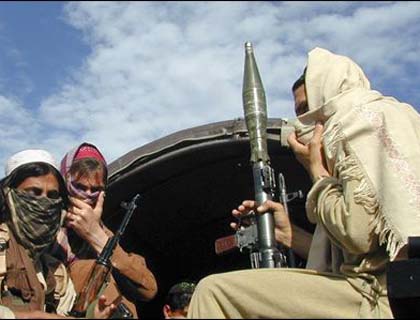KABUL - The teenage insurgents spend their days learning to make shoes and bookshelves, listening to religious leaders denounce the radical interpretation of Islam they learned as children.
But when they return to their cells at Kabul's juvenile rehabilitation center, the boys with wispy beards and cracking voices talk only of the holy war from which they were plucked and their plans to resume fighting for the Taliban.
"They bring us here to change us," said Nane Asha, in his late teens. "But this is our way. We cannot be changed."
As the Taliban presses its efforts to recruit teenage fighters, Afghan officials and their international backers have crafted a program to reintegrate the country's youngest insurgents into mainstream society. But that ambition is coming up against the intransigence of the teens, who say they would rather be on the battlefield.
"We'll fight against America for a thousand years if we have to," said Ali Ahmad, 17, sitting at a desk that has hearts and Koran verses scratched in the wood. "Jihad is the duty of every Muslim."
Before joining the insurgency in their early teens, the fighters were students, part-time shopkeepers and farmhands, mostly living in the Pashtun-dominated regions of southern and eastern Afghanistan. Some say their parents supported the decision to take up arms. Others left home without warning, disregarding the wishes of relatives and heeding what they call a religious and moral obligation.
Here at the detention center, they live alongside a large group of teens found guilty of crimes unrelated to terrorism. Often, young Taliban members are described as desperate rather than ideological, but the 30 teenage fighters here appear undeterred and unrepentant, and they vow strict adherence to the group's creed.
"We tell them, 'You could be a mullah or a tailor or a carpenter.' But they come here with a misinterpretation of the Holy Koran stuck in their mind. It can be hard to erase that," said Shah Abbas Bashardost, who works with the boys.
"If we can't get through to the kids, who can we rehabilitate?" Bashardost said.
Reintegration is at the heart of U.S. and Afghan government strategies to wind down the war, with schooling and employment being offered to coax fighters away from the insurgency. Juvenile offenders seemed a sensible starting point in that campaign, because many assumed they would be easier to win over than adults who have spent years, or even decades, waging war.
In the next few years, reintegration programs such as the one at the Kabul juvenile center — which is run by Afghans but bolstered by foreign supporters, including the United States — are expected to take shape at prisons across the country. But the disappointing results at the Kabul facility reflect the challenges facing the campaign.
The experience of boys such as Asha and Ahmad suggests that after years of religious schooling and combat, the draw of war might be too strong to overcome. (Agencies)

